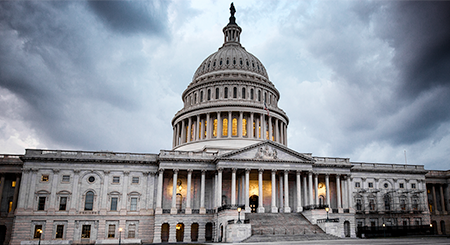FY 18 Funding Bill a Win for Science
By Tawanda W. Johnson, APS Press Secretary
The diligent work of APS members, coupled with support from the APS Office of Government Affairs (APS OGA), contributed to a tremendous win for science agencies in the fiscal year (FY) 2018 omnibus bill. From writing op-eds and meeting with staff at their congressional offices to sending letters and making phone calls, APS members made a strong and persuasive case for the federal support of science.
The funding bill, signed into law on March 23 by President Trump, calls for between 5 percent and 16 percent growth in the research sections of agencies that APS OGA advocates for: the U.S. Department of Energy’s Office of Science (DOE SC), National Science Foundation (NSF), National Institute of Standards and Technology (NIST), and the Department of Education.
For DOE SC, the bill increases the agency’s budget to $6.3 billion or 16 percent over FY 2017. DOE SC funds research in areas such as basic energy sciences, high energy physics and nuclear physics.
NSF’s research and related activities account—which funds extramural research grants—increased by 5 percent to $6.33 billion.
The NIST science account, which includes funding for research user facilities, received a 5 percent boost to $725 million.
In the Department of Education, the bill funds sections II A and IV of the Every Student Succeeds Act (ESSA) for teacher preparation and afterschool programs. The sections had been zeroed out or deeply cut in the president’s budget request. Under the FY 2018 omnibus, the sections are being funded at their FY 2017 level.
“APS members played a critical role in ensuring that the federal government maintains a strong investment in science and that the U.S. can remain a global leader in STEM,” said Francis Slakey, chief government affairs officer at APS OGA. “Numerous professional societies made the case for science, but APS took a grassroots approach that focused on the local benefits of the federal investment.”
APS OGA’s partnerships with APS members on numerous statewide and Unit-specific campaigns contributed to the big win for research funding. For example, campaigns for the Division of Nuclear Physics and Division of Particles and Fields, which involved members of the Topical Group on Hadronic Physics, urged support for federal science funding. Moreover, the Forum on Physics and Society advocated for Congress to increase budgetary caps on the federal budget. APS OGA also partnered with the Society of Physics Students to stress the importance of federal funding that enables undergraduate research, including the Research Experiences for Undergraduates program at NSF.
In addition, the Forum on Education (FEd) addressed science education funding, specifically for teacher preparation and afterschool programs. The FEd campaign also amplified an op-ed published in the St. Louis Dispatch by Karen King, assistant teaching professor in the Department of Physics and Astronomy at the University of Missouri. APS member Eric Brewe, a professor at Drexel University, along with APS President Roger Falcone and APS Past President Laura Greene also played integral roles in underscoring the importance of sections of ESSA through meetings on Capitol Hill.
Greg Mack, manager of grassroots advocacy for APS OGA, said the department’s online Advocacy Dashboard was instrumental in enabling APS members to advocate on the budget and other issues.
“Through the Advocacy Dashboard, APS members had year-round access to letters, tweets and phone scripts that were updated to keep pace with changing developments on budget,” he said. “I’m excited by the thousands of APS members who took action, and I look forward to keeping up the momentum for fiscal year 2019.”
Mark Elsesser, manager of science policy for APS OGA, said he, too, looks forward to building on the FY 2018 results after APS members helped to overcome three major hurdles during the appropriations process.
“The first key win was Congress rejecting the proposed deep cuts to science in the president’s budget request. The next step was successfully advocating for Congress to raise the budget caps. Finally, we had to persuade Congress to prioritize science in the omnibus bill and provide robust funding to the science agencies that are important to our members,” he recalled.
Elsesser added, “It was great to see congressional leaders—on both sides of the political aisle—respond to our requests and recognize the value of science. These funding increases send a clear signal to the world that the U.S. plans to remain a global leader in science and technology.”

